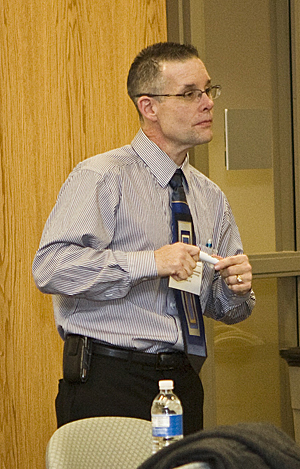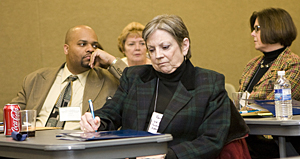ADVERTISEMENT
- Rozovsky wins prestigious NSF Early Career Award
- UD students meet alumni, experience 'closing bell' at NYSE
- Newark Police seek assistance in identifying suspects in robbery
- Rivlin says bipartisan budget action, stronger budget rules key to reversing debt
- Stink bugs shouldn't pose problem until late summer
- Gao to honor Placido Domingo in Washington performance
- Adopt-A-Highway project keeps Lewes road clean
- WVUD's Radiothon fundraiser runs April 1-10
- W.D. Snodgrass Symposium to honor Pulitzer winner
- New guide helps cancer patients manage symptoms
- UD in the News, March 25, 2011
- For the Record, March 25, 2011
- Public opinion expert discusses world views of U.S. in Global Agenda series
- Congressional delegation, dean laud Center for Community Research and Service program
- Center for Political Communication sets symposium on politics, entertainment
- Students work to raise funds, awareness of domestic violence
- Equestrian team wins regional championship in Western riding
- Markell, Harker stress importance of agriculture to Delaware's economy
- Carol A. Ammon MBA Case Competition winners announced
- Prof presents blood-clotting studies at Gordon Research Conference
- Sexual Assault Awareness Month events, programs announced
- Stay connected with Sea Grant, CEOE e-newsletter
- A message to UD regarding the tragedy in Japan
- More News >>
- March 31-May 14: REP stages Neil Simon's 'The Good Doctor'
- April 2: Newark plans annual 'wine and dine'
- April 5: Expert perspective on U.S. health care
- April 5: Comedian Ace Guillen to visit Scrounge
- April 6, May 4: School of Nursing sponsors research lecture series
- April 6-May 4: Confucius Institute presents Chinese Film Series on Wednesdays
- April 6: IPCC's Pachauri to discuss sustainable development in DENIN Dialogue Series
- April 7: 'WVUDstock' radiothon concert announced
- April 8: English Language Institute presents 'Arts in Translation'
- April 9: Green and Healthy Living Expo planned at The Bob
- April 9: Center for Political Communication to host Onion editor
- April 10: Alumni Easter Egg-stravaganza planned
- April 11: CDS session to focus on visual assistive technologies
- April 12: T.J. Stiles to speak at UDLA annual dinner
- April 15, 16: Annual UD push lawnmower tune-up scheduled
- April 15, 16: Master Players series presents iMusic 4, China Magpie
- April 15, 16: Delaware Symphony, UD chorus to perform Mahler work
- April 18: Former NFL Coach Bill Cowher featured in UD Speaks
- April 21-24: Sesame Street Live brings Elmo and friends to The Bob
- April 30: Save the date for Ag Day 2011 at UD
- April 30: Symposium to consider 'Frontiers at the Chemistry-Biology Interface'
- April 30-May 1: Relay for Life set at Delaware Field House
- May 4: Delaware Membrane Protein Symposium announced
- May 5: Northwestern University's Leon Keer to deliver Kerr lecture
- May 7: Women's volleyball team to host second annual Spring Fling
- Through May 3: SPPA announces speakers for 10th annual lecture series
- Through May 4: Global Agenda sees U.S. through others' eyes; World Bank president to speak
- Through May 4: 'Research on Race, Ethnicity, Culture' topic of series
- Through May 9: Black American Studies announces lecture series
- Through May 11: 'Challenges in Jewish Culture' lecture series announced
- Through May 11: Area Studies research featured in speaker series
- Through June 5: 'Andy Warhol: Behind the Camera' on view in Old College Gallery
- Through July 15: 'Bodyscapes' on view at Mechanical Hall Gallery
- More What's Happening >>
- UD calendar >>
- Middle States evaluation team on campus April 5
- Phipps named HR Liaison of the Quarter
- Senior wins iPad for participating in assessment study
- April 19: Procurement Services schedules information sessions
- UD Bookstore announces spring break hours
- HealthyU Wellness Program encourages employees to 'Step into Spring'
- April 8-29: Faculty roundtable series considers student engagement
- GRE is changing; learn more at April 15 info session
- April 30: UD Evening with Blue Rocks set for employees
- Morris Library to be open 24/7 during final exams
- More Campus FYI >>
9:20 a.m., April 9, 2010----A conference held at the University of Delaware's Center for Disabilities Studies (CDS) on March 5 brought together professionals from UD, state agencies, and nonprofit organizations to explore the issue of self-employment for entrepreneurs with disabilities.
The conference was hosted by the Delaware Assistive Technology Initiative (DATI) of CDS, which connects Delawareans who have disabilities with the tools they need in order to learn, work, play and participate in community life safely and independently.
Beth Mineo, director of CDS and DATI, and Eileen Mapes, DATI information and outreach coordinator, organized the conference.
Michael Gamel-McCormick, then-dean of the College of Education and Public Policy and former CDS director, welcomed the 30 attendees with a message about taking risks. He noted that there has been too much caution surrounding employment options for people with disabilities and said that it is important to create systems to allow people to take risks while providing supports that help them succeed.
The conference focused on the benefits of microenterprise for people with disabilities and the keys to successful employment.
To start a microenterprise, the entrepreneur often needs financial aid. In Delaware, DATI manages the Delaware Telework Equipment Loan Program (DTELP), which lends money to assist Delawareans with disabilities in acquiring the equipment they need to help them work from home or other locations remote from an employer.
One of the conference presenters was Kathy Gilman, program director of the Washington Access Fund in Seattle. She defined microenterprise as a business with five or fewer employees requiring initial capitalization of $35,000 or less.
Gilman explained that microenterprise is a good option for an entrepreneur with a disability because it allows for independence, the opportunity to make one's own business decisions, and the ability to set one's own pace and schedule. Transportation problems are reduced because the business is typically home based. In addition, the business owner is able to continue to receive support from Social Security Disability Insurance (SSDI) or Supplemental Security Income (SSI), including health care, when income and assets are within the requirements of these programs.
Gilman discussed the five keys to successful self-employment: have a clear idea and passion; know what it means to run a business; know one's personal financial situation, including benefits planning; develop a support network; and write a business plan based on research done by the entrepreneur.
She also shared information about how to plan for self-employment with the state's Division of Vocational Rehabilitation.
Also presenting at the conference was E. Basil Kessler, executive director of the Kansas Assistive Technology Cooperative (KATCO) in Emporia, an organization with the same goals as DATI. KATCO provides Kansans with disabilities and their families access to financial resources for acquiring assistive technology.
As Kessler facilitated the conference's group working session, he pointed out that people with disabilities who are interested in self-employment need so much more than financial support. He emphasized the importance of brokering partnerships that offer the kind of support that enables entrepreneurs to make the decision to live independently. Kessler then engaged conference participants in a discussion about partnering and promoting self-employment.
Ronnie Cohen, director of the Delaware Financial Literacy Institute, listed more than a dozen partners with which her organization works. “Our whole capacity is based on partnership,” she stated.
Representatives from such state agencies as the Division of Vocational Rehabilitation, Division for the Visually Impaired, Division of Substance Abuse and Mental Health, and Division of Medicaid and Medical Assistance shared the ways in which they are encouraging and supporting self-employment.
The day's exploration of needs, opportunities, and existing community resources yielded the realization that Delaware already has all the key elements in place to support people with disabilities who wish to be self-employed. There are organizations that cultivate self-determination, develop job skills, provide financial literacy classes, help people develop business plans, and offer funding to support business start-up.
The challenge is to weave these elements into a seamless system, and those attending the conference made the commitment to work together to make this happen.
To learn more about supports and resources for Delawareans with disabilities, contact the CDS at (302) 831-6974. For specific information about business development or the loan program for work-related equipment, contact DATI at 302-651-6869.
Article by Michele Sands
Photos by Ambre Alexander




